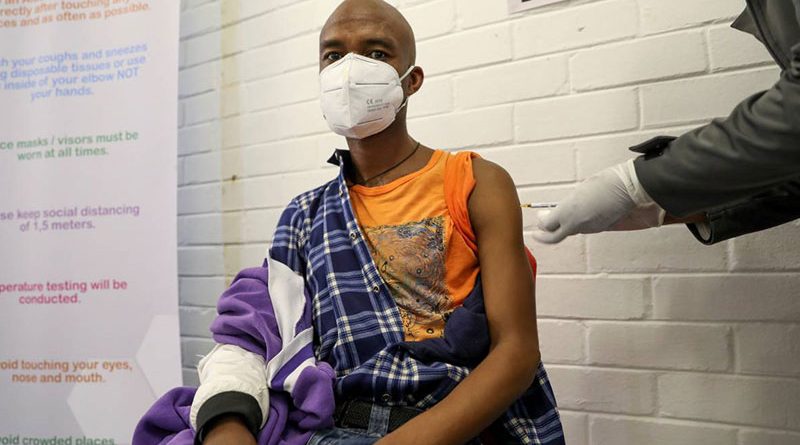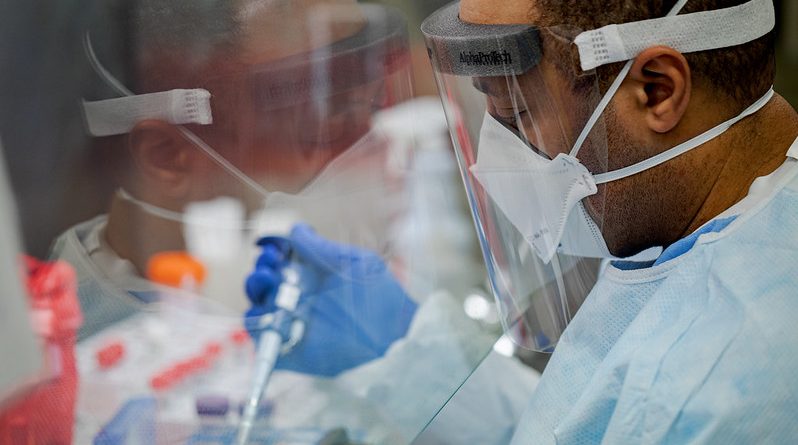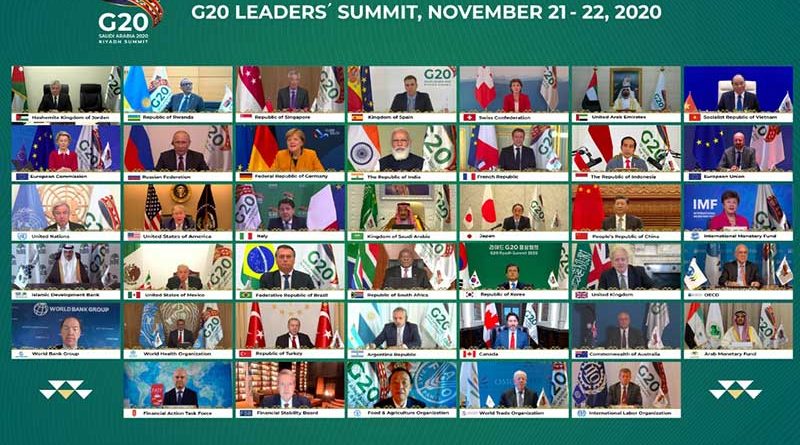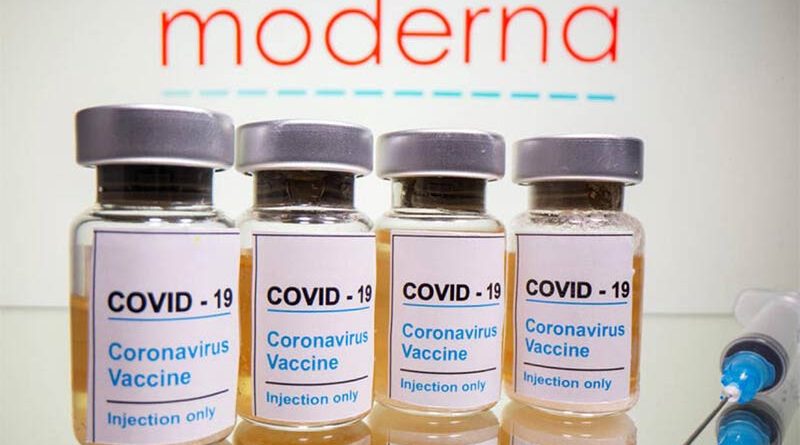NEARLY 2 billion doses of COVID-19 vaccines will be shipped and flown to developing countries next year in a “mammoth operation”, the U.N. children’s agency UNICEF said on Monday, as world leaders vowed to ensure the fair distribution of vaccines.
UNICEF said it was working with over 350 airlines and freight companies to deliver vaccines and 1 billion syringes to poor countries such as Burundi, Afghanistan and Yemen as part of COVAX, a global COVID-19 vaccine allocation plan with the World Health Organization (WHO).
“This invaluable collaboration will go a long way to ensure that enough transport capacity is in place for this historic and mammoth operation,” said Etleva Kadilli, director of UNICEF’s Supply Division, in a statement.
COVAX – co-led by GAVI vaccine group, the WHO and the Coalition for Epidemic Preparedness Innovations – aims to discourage governments from hoarding COVID-19 vaccines and to focus on first vaccinating the most at risk in every country.
At a G20 summit this weekend, leaders of the biggest 20 world economies pledged to ensure the equitable distribution of COVID-19 vaccines, drugs and tests so that poorer countries are not left out.
Even before the pandemic hit, access to vaccines was unequal with around 20 million babies not receiving vaccines that could save them from serious diseases, death, disability and ill health, according to the WHO.
“We need all hands on deck as we get ready to deliver COVID-19 vaccine doses, syringes and more personal protective equipment to protect frontline workers around the globe,” said UNICEF’S Kadilli, who is working with the Pan American Health Organization and the International Air Transport Association.
UNICEF’s role with COVAX stems from its status as the largest single vaccine buyer in the world.
It said it procures more than 2 billion doses of vaccines annually for routine immunization and outbreak response on behalf of nearly 100 countries.
Drugmakers and research centres worldwide are racing to develop COVID-19 vaccines, with large global trials of several of the candidates involving tens of thousands of participants well underway.
Pfizer Inc and BioNTech could secure emergency U.S. and European authorisation for their COVID-19 vaccine next month after final trial results showed a 95% success rate and no serious side effects.
Moderna Inc last week released preliminary data for its vaccine showing 94.5% effectiveness.
The better-than-expected results from the two vaccines, both developed with new messenger RNA (mRNA) technology, have raised hopes for an end to a pandemic that has killed more than 1.3 million people and wreaked havoc upon economies and daily life.
Source – Thomson Reuters Foundation.
THE first Americans could receive a COVID-19 vaccine as soon as December 11, the chief scientific adviser for the U.S. government’s vaccine program said on Sunday.
“Within 24 hours from the approval, the vaccine will be moving and located in the areas where each state will have told us where they want the vaccine doses,” Dr. Moncef Slaoui, part of the “Operation Warp Speed” vaccine program, told NBC’s “Meet the Press.”
The U.S. Food and Drug Administration’s outside advisers will meet on December 10 to discuss whether to authorize the COVID-19 vaccine developed by Pfizer Inc and German partner BioNTech for emergency use.
The vaccine, which requires two doses administered about three weeks apart, has been shown to be 95% effective with no major safety concerns. Pfizer expects to have enough doses to protect 25 million people by the end of the year.
The vaccine will be distributed based on each state’s population, Slaoui said. Each state will decide who gets the vaccine first with the recommendation that priority be given to health care workers, front-line workers and the elderly who face the highest risks of dying from the virus.
About 70% of the population needs to be immunized to achieve herd immunity, a goal the country could reach by May, he said.
The United States faces the challenge of distributing vaccines to more than 330 million Americans while also combating misinformation about vaccines spread on social media.
Incoming White House Chief of Staff Ron Klain said it was crucial to have a seamless flow of information between President Donald Trump’s coronavirus experts and President-Elect Joe Biden’s transition team to avoid delays in distribution after Biden takes office on January 20.
Slaoui told ABC’s “This Week” he had not spoken to anyone from Biden’s team. Biden warned last week that “more people will die if we don’t coordinate.”
The number of U.S. coronavirus cases has surpassed 12 million and rose by more than 1 million cases in less than a week for the first time.
The U.S. Centers for Disease Control and Prevention recommended against travelling for the Thanksgiving holiday on Thursday, but many Americans are ignoring that warning.
Posts on social media showed crowded airports across the country. Hospitals are straining under a record number of COVID-19 patients and doctors fear that number will surge following family gatherings this week.
Testing shortages still plague many parts of the country 10 months after the first coronavirus case was detected in the United States. Most pharmacies offering COVID-19 tests in suburban Chicago were fully booked ahead of Thanksgiving and lines at state testing facilities that do not require appointments were busy with cars lining up for over an hour at one site in Aurora, Illinois. Long lines of pedestrians also formed outside clinics in some New York City boroughs.
Deaths have topped 255,000 with many health experts warning deaths will rise to over 2,000 a day in the coming weeks.
“We’re clearly involved now in a very, very difficult surge here throughout the United States and even globally,” Dr Anthony Fauci, the nation’s top infectious disease expert, told NBC.
Source – Thomson Reuters Foundation.
LEADERS of the 20 biggest economies have vowed to spare no effort to supply COVID-19 drugs, tests and vaccines affordably and fairly to “all people”, reflecting worries that the pandemic could deepen divisions between the world’s rich and poor.
The pandemic and prospects of an uneven and uncertain economic recovery were at the centre of a two-day online summit under the chairmanship of Saudi Arabia, which will hand the G20 presidency to Italy next month.
“The COVID-19 pandemic and its unprecedented impact in terms of lives lost, livelihoods and economies affected, is an unparalleled shock that has revealed vulnerabilities in our preparedness and response and underscored our common challenges,” the final communique said.
G20 nations will work to “protect lives, provide support with a special focus on the most vulnerable, and put our economies back on a path to restoring growth, and protecting and creating jobs for all”.
On vaccines, tests and treatments, the leaders said: “We will spare no effort to ensure their affordable and equitable access for all people.”
“There is a clear recognition from the G20: If we leave any country behind, we will all be behind,” Saudi Finance Minister Mohammed al-Jadaan told the closing news conference.
The world’s economy has suffered a sharp contraction this year as measures to contain the spread of the virus have curbed transport, trade, and demand across the planet.
The meeting was held by video link, like many such gatherings this year. Saudi King Salman said in his closing remarks that the group had “adopted important policies that will achieve recovery all the way to an economy that is resilient, sustainable, inclusive, and balanced”.
G20 leaders said that, while global economic activity has partially picked up thanks to the gradual reopening of some countries and sectors, the recovery was uneven and highly uncertain.
They reaffirmed their commitment to use “all available policy tools as long as required” to protect lives, jobs, and incomes.
They also said climate change was a pressing challenge.
The pandemic has made governments around the world more aware of the fact that economies have to be developed sustainably and not at the expense of the environment, German Chancellor Angela Merkel said.
U.S. President Donald Trump used his final G20 summit to defend his decision to withdraw the United States from the Paris climate accord, a move that took effect on Nov. 4, a day after the presidential election won by Democrat Joe Biden, who has said the United States will rejoin as soon as he takes office.
DEBT FREEZE
The G20 endorsed a plan to extend a freeze in debt service payments by the poorest countries to mid-2021 and a common approach for dealing with debt problems beyond that, according to the communique.
The Debt Service Suspension Initiative has helped 46 countries defer $5.7 billion in 2020 debt service payments, short of the 73 countries that were eligible, and promised savings of around $12 billion.
The head of the International Monetary Fund, Kristalina Georgieva, said the G20’s actions to mitigate the impact of COVID-19 had helped prevent massive bankruptcies and an even deeper crisis, but that there was more to do.
“The world is not out of the woods yet in terms of this crisis. Cooperation is going to be even more important going forward,” she said in a statement after addressing G20 leaders.
She called for a prompt and effective implementation of the G20 framework for debt treatments beyond the debt relief initiative, adding:
“We must also help those countries not covered by the Framework to address debt vulnerabilities so that their economies can become more resilient.”
In their joint statement, the leaders said they strongly encouraged private creditors to participate in the initiative on comparable terms when requested by eligible countries.
Debt relief for Africa will be an important theme of the Italian presidency next year.
Source – Thomson Reuters Foundation.
MODERNA has revealed that its experimental vaccine was 94.5% effective in preventing COVID-19 based on interim data from a late-stage clinical trial, becoming the second U.S. company in a week to report results that far exceed expectations.
Following are reactions to the news.
WALID GELLAD, PROFESSOR OF MEDICINE, UNIVERSITY OF PITTSBURGH, PENNSYLVANIA
“Now we know that the vaccine appears to be highly effective. It also seems like we really need the vaccine right now, because we have no coherent national strategy. And the next two months are looking dismal. So there, there has to be some willingness for uncertainty and flexibility in times of crisis… FDA can safely schedule this committee sometime soon.
“If you look at the state of the pandemic right now, and the exponential rise and the stress on the healthcare system, and the assumption that that’s going to get worse, the rising cases in nursing home, the Thanksgiving holiday, and later Christmas holiday and other holidays, all of that is an environment, that it’s just going to add fuel to the fire… with the rate things are moving and the holidays, actually two or three weeks, I think makes a big difference right now.”
DR. ANTHONY FAUCI, THE TOP U.S. INFECTIOUS DISEASE EXPERT, SAID ON A CALL WITH REPORTERS:
“The vaccine is really the light at the end of the tunnel.”
Fauci urged Americans not to let their guard down because of this news, but to continue washing hands, avoiding crowds and being vigilant about social distancing.
ZOLTAN KIS, RESEARCH ASSOCIATE AT THE FUTURE VACCINE MANUFACTURING HUB, IMPERIAL COLLEGE LONDON
“If mRNA vaccines against COVID-19 gain regulatory approval, this will be a huge validation of the RNA vaccine production platform technology.
“Using this technology, vaccine candidates can be produced substantially faster in the future to combat virtually any infectious disease, by producing vaccines against both existing pathogens and future, currently unknown pathogens.
“Vaccine candidates can be produced against virtually any disease, because this is a platform technology, meaning that the production process, the purification processes and the formulation processes can remain the same no matter what vaccine or vaccine candidate is produced.
“This is a huge advantage in terms of the speed at which vaccine candidates can be developed and produced in the future.
“In the case of conventional vaccine production technologies, each vaccine required the development of a new production process, whereas in the case of the RNA vaccine production platform technology one process can produce vaccines and vaccine candidates against virtually any disease.”
PENNY WARD, VISITING PROFESSOR IN PHARMACEUTICAL MEDICINE AT KING’S COLLEGE LONDON AND CHAIR OF THE EDUCATION AND STANDARDS COMMITTEE OF THE FACULTY OF PHARMACEUTICAL MEDICINE
“Given the general similarity of the vaccine target and the immunological responses observed for all vaccines, these data generally suggest that vaccination will protect against severe illness and thereby should protect people from needing hospitalization or from dying from COVID.
“We still need to know if there is protection against infection, as the latter leads to herd protection while protection against illness has a value for an individual it will not prevent circulation of virus and risk of disease in unvaccinated persons, or in people not responding adequately to vaccination.”
RICHARD HATCHETT, CEO OF THE COALITION FOR EPIDEMIC PREPAREDNESS INNOVATIONS (CEPI)
(CEPI was set up in 2017 to fight emerging epidemics and is backed by 14 governments, the Bill and Melinda Gates Foundation and Britain’s Wellcome Trust)
“The Moderna results are as good as we could have hoped for and really terrifically encouraging.
“Moderna has also released information which suggests that the vaccine may protect against more severe disease (although they don’t address the statistical significance of this finding), and the reported side effects appear to be manageable.
“The fact that the vaccine shows stability when stored in a normal refrigerator for up to 30 days is also terrific news and will allow the vaccine to be distributed broadly.”
ANDREW HILL, SENIOR VISITING RESEARCH FELLOW IN THE DEPARTMENT OF PHARMACOLOGY AT THE UNIVERSITY OF LIVERPOOL
“This vaccine would be much easier to transport and administer than the one from Pfizer. Also the preliminary evidence suggests that it can prevent severe COVID-19 disease. However the Moderna vaccine is more expensive and there are fewer doses available in the next year.” “No vaccine company has enough supplies available to protect everyone in need. We will need all the available vaccines with over 90% efficacy to cover global demand.”
ELEANOR RILEY, PROFESSOR OF IMMUNOLOGY AND INFECTIOUS DISEASE AT THE UNIVERSITY OF EDINBURGH
“Although the numbers are small, this trial also gives an indication that vaccination is effective in older and BAME individuals and prevents severe disease, all of which are key to allowing the world to start opening up again. The absolute prerequisite for a COVID-19 vaccine is that it stops people becoming ill enough to require hospital treatment and stops people dying. The preliminary data reported here suggest that this vaccine – and by extension, the Pfizer/BioNtech vaccine – will achieve this goal.
“The safety data also look promising. The side effects of vaccination appear to be in line with those typically seen for other adult vaccinations, including the seasonal influenza vaccination which is administered in many millions of doses every year.
“One important unknown is whether this vaccine, or any of the vaccines currently in trials, prevents disease transmission. It is likely that vaccines that prevent symptomatic disease will reduce the duration and level of infectiousness, and thus reduce transmission, but we don’t yet know if this effect will be large enough to make any meaningful difference to the spread of the virus within communities.
“But, overall, this is excellent news. Having more than one source of an effective vaccine will increase the global supply and, with luck, help us all to get back to something like normal sometime in 2021.”
PROF TRUDIE LANG, DIRECTOR, THE GLOBAL HEALTH NETWORK, NUFFIELD DEPARTMENT OF MEDICINE, UNIVERSITY OF OXFORD
“It is very good news indeed to see another vaccine coming through with similar efficacy results as were reported last week from Pfizer. This is also an interim analysis, which means that there were enough cases within the vaccinated volunteers to give statistical significance and allow the team to break the blind to determine who had the active vaccine and who had placebo.
“Here they found that of 95 cases of COVID, 90 had received the placebo and five the active vaccine. These early results suggest that there was a representation across different age groups and diverse communities in the protected group. This is really encouraging and it further demonstrates that a vaccine for COVID is a real probability and that having more than one supplier should help assure better and more equitable global availability.
“This vaccine is also an mRNA vaccine, so many of the same questions remain as we have been discussing with the Pfizer vaccine and these will be looked at carefully by the regulators.”
STEPHEN EVANS, PROFESSOR OF PHARMACOEPIDEMIOLOGY, LONDON SCHOOL OF HYGIENE & TROPICAL MEDICINE
“This announcement from Moderna is a further encouragement that vaccines will be found to not only have an acceptable efficacy, but an efficacy that is much greater than we had anticipated. This press release is more specific than that of others, in that it confirms the numbers in each group, which was able to be guessed at but to have it confirmed is helpful.
“The range of minor adverse effects reported are unsurprising and typical of almost any vaccine. These reactions tend to be local to where the injection was given and are rarely long-lasting or severe.
“Although they reported efficacy being over 94%, there is statistical uncertainty in this; but based on these data, the likely efficacy will be better than 85% which would be greater than most scientists would have expected.
“This is the first study to report on severe cases and, while uncertainty remains, the finding of no severe cases with the vaccine and 11 cases with placebo is very strong evidence that the vaccine prevents severe as well as mild disease. It is likely that convincing evidence in respect to deaths will probably only be obtained when the vaccine is in use.
“A wide range of people with illnesses and from minority groups were included in the trials as well as substantial numbers of older patients. We will need much more data and a full report or publication to see if the benefit is consistent across all groups, notably the elderly, but this is definitely encouraging progress.”
PETER OPENSHAW, PROFESSOR OF EXPERIMENTAL MEDICINE AT IMPERIAL COLLEGE LONDON
“This news from Moderna is tremendously exciting and considerably boosts optimism that we will have a choice of good vaccines in the next few months.”
“This latest press release is based on a study of 30,000 U.S. adults, including many high-risk or elderly persons. This gives us confidence that the results are relevant in the people who are most at risk of COVID-19 and in most need of the vaccines.”
“Moderna have also announced that the vaccine can be kept in a conventional freezer (-20 degrees Celsius) for up to 6 months, and that once thawed the vaccine can be kept for up to 30 days at standard refrigerator (2 to 8 degrees centigrade). This makes the vaccine much easier to deliver.
“In terms of side effects, news is also quite good. The first dose caused injection site pain in about 3% of people; the second dose was associated with transient generalized symptoms in about 10% of people with fatigue, muscle aches and flu like symptoms. This seems to indicate that they got the dose about right with acceptable adverse events. These effects are what we would expect with a vaccine that is working and inducing a good immune response.”
“We need more complete details than we have in this press release, but this announcement adds to the general feeling of optimism about vaccines for Covid-19. What we still don’t know is how long any protective immunity may last. For that, we will need to wait.”
Corporate reaction:
ALBERT BOURLA, CEO OF PFIZER, SAID ON TWITTER:
“I am thrilled to hear the good news coming out of @moderna_tx’s #COVID19 vaccine development programme. Our companies share a common goal – defeating this dreaded disease – and today we congratulate everyone at Moderna and share in the joy of their encouraging results.”
KIRILL DMITRIEV, CEO OF RUSSIA’S RDIF, WHICH IS MARKETING RUSSIA’S SPUTNIK V VACCINE, WAS QUOTED ON SPUTNIK V TWITTER FEED:
“Very pleased with positive news from Moderna, the world needs a portfolio of vaccines. Vaccines with 90% plus efficiency are very promising, can save lives and restore economic growth”.
Political reaction:
U.S. PRESIDENT DONALD TRUMP SAID ON TWITTER:
“Another Vaccine just announced. This time by Moderna, 95% effective. For those great “historians”, please remember that these great discoveries, which will end the China Plague, all took place on my watch!”
U.S. PRESIDENT-ELECT JOE BIDEN SAID ON TWITTER:
“Today’s news of a second vaccine is further reason to feel hopeful.”
“What was true with the first vaccine remains true with the second: we are still months away. Until then, Americans need to continue to practice social-distancing and mask-wearing to get the virus under control.”
ALEX AZAR, SECRETARY OF THE U.S. DEPARTMENT OF HEALTH & HUMAN SERVICES, SAID ON TWITTER:
“This news is another stunning result of President Trump’s leadership and his unwavering support for #OperationWarpSpeed, an incredible tribute to American scientists and innovators, and one more reminder that there is light at the end of the tunnel.”
Market reaction:
BRAD LONCAR, HEALTHCARE INVESTOR, CEO OF LONCAR INVESTMENTS, KANSAS CITY
“It’s really incredible to think back to January and February, messenger RNA was a totally unproven technology for anything, let alone vaccines. And you have to give a lot of credit to these companies. And you have to give a lot of credit to Dr. Fauci. It was a big bet – it was a risky thing to bet on.
“It’s hugely important that now two vaccines have succeeded, instead of just one. The entire country and the entire world is going to need to get vaccinated one day, and we need many vaccines. We need more than just these two to succeed because we’re going to be capacity constrained.
“(Moderna and Pfizer) should be filing for approval within the next two to three weeks. And I think it’s fair to say that both of these will likely be approved in early to mid December. And I think that the first group – healthcare workers and people like that – will be vaccinated before the end of the year.
“To the extent that the Moderna one makes it easier logistically to deliver and specifically store, that’s a hugely important thing. Probably the people who will benefit most from it are people who traditionally don’t have the highest access to healthcare – people in rural areas or poorer countries.”
Source: The African Mirror




